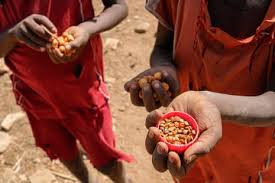Burkina Faso’s grain production is forecasted to grow by 18% in the upcoming 2024/2025 agricultural season, according to preliminary estimates from the Ministry of Agriculture. The total grain yield is expected to reach 6,077,227 tonnes, marking a significant improvement over the previous season. This increase also represents a 21.4% rise compared to the average production over the past five years, underscoring a notable upward trajectory for the country’s agricultural sector.
The Ministry of Agriculture has attributed this anticipated growth to favorable climatic conditions, which have provided an ideal environment for grain cultivation. With agriculture serving as the backbone of Burkina Faso’s economy, this projected boost is a promising sign for national food security and broader economic stability.
According to ministry officials, the expected production will not only meet Burkina Faso’s domestic grain requirements but also generate a surplus. Authorities estimate the harvest will cover 111% of the country’s grain needs, reflecting an 11% surplus. This marks a substantial improvement compared to the previous season, when grain production covered 97% of the nation’s needs.
This anticipated surplus is a critical achievement for Burkina Faso, a country where food security remains a priority amid challenges such as population growth, climatic variability, and regional instability. The ministry’s projections signal a significant step toward achieving self-sufficiency and ensuring a reliable grain supply for both rural and urban populations.
Favorable weather patterns have played a pivotal role in this projected increase, according to agricultural experts. Consistent rainfall, alongside improved temperature conditions, has created an environment conducive to higher yields across staple crops, including maize, sorghum, millet, and rice. These grains form the cornerstone of Burkina Faso’s agricultural output and are vital to national food security.
In recent years, Burkina Faso has experienced mixed agricultural performance due to erratic weather patterns, droughts, and challenges related to soil fertility. However, the ministry’s optimistic outlook for 2024/2025 reflects ongoing resilience and the ability of farmers to capitalize on favorable conditions when they arise.
The anticipated growth in grain production aligns with Burkina Faso’s broader agricultural strategy, which aims to improve food security, reduce dependence on grain imports, and strengthen the resilience of rural communities. With agriculture employing approximately 80% of the country’s workforce, success in this sector has wide-ranging implications for livelihoods, economic stability, and poverty reduction.
The government’s agricultural policies have increasingly focused on improving productivity through better access to inputs, including seeds, fertilizers, and modern farming equipment. Additionally, efforts to promote climate-smart agricultural practices are contributing to improved resilience in the face of environmental challenges.
The projected surplus for the 2024/2025 season is expected to enhance food availability and affordability, reducing the risk of hunger and malnutrition, particularly in vulnerable communities. Furthermore, surplus production could position Burkina Faso to support regional grain markets, contributing to food security efforts across the Sahel.
Despite the optimistic forecast, challenges remain within Burkina Faso’s agricultural sector. Climate variability, insecurity in certain regions, and limited infrastructure continue to pose risks to production and distribution. While favorable weather conditions have driven the current outlook, ensuring long-term growth will require sustained investments in irrigation systems, storage facilities, and transportation networks.
Insecurity remains a particular concern, as conflicts in parts of the country have disrupted farming activities and displaced populations. Addressing these challenges will be crucial to maintaining the positive trajectory projected for the upcoming season.














Leave a comment